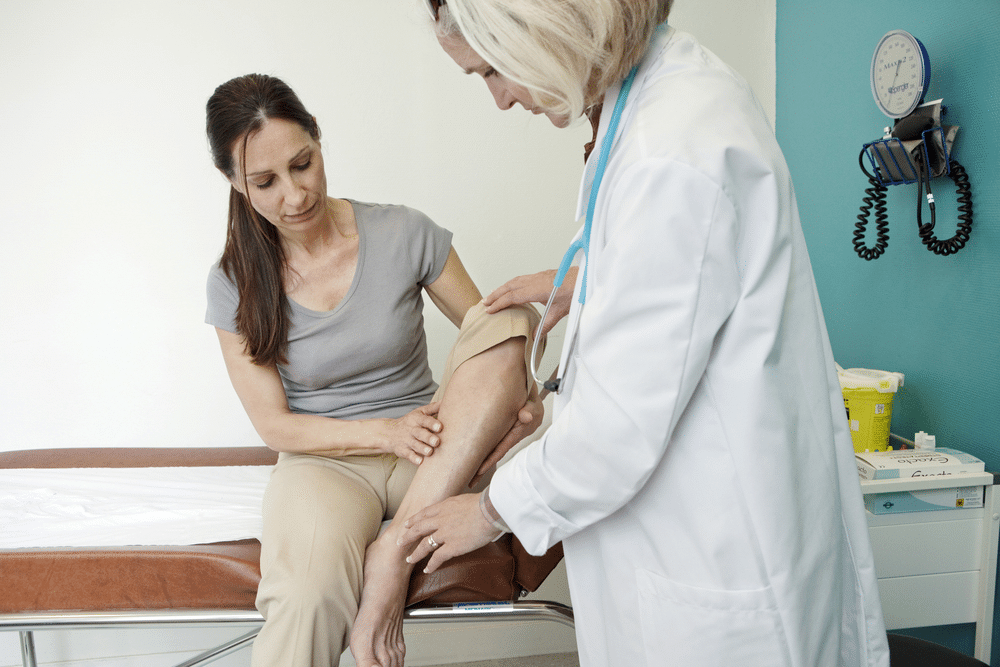Don’t ignore venous disorders. If you do not seek professional treatment, serious complications can occur. Today, our vein experts at VENUS Vein Clinic in Omaha, NE discuss eight signs you have a venous disorder and should see a vein specialist.
8 Signs You Should See a Vein Specialist
1. You Have Asymmetrical Pain or Swelling
When most people experience pain and inflammation, they assume they injured a muscle or joint. However, pain and inflammation can point to venous or circulatory problems. If you are experiencing swelling, fluid retention or pain in one leg but not the other, there is a good chance poor circulation is the cause. If poor circulation is occurring, you need to see a vein specialist.
2. You Have Visibly Discolored or Bulging Veins
Another sign you may suffer from a venous disorder is you can see bulging red, purple or blue veins. People often think varicose or spider veins are a cosmetic issue. Nevertheless, such disordered veins can lead to serious health concerns in the future if left untreated. It is important to have bulging, discolored veins evaluated by a specialist.
Additionally, larger veins that are varicose often lead to burning, dryness or severe discomfort in the affected area. Varicose veins are often identified by their protuberant, twined appearance. Many liken this to a cord knotted beneath their skin.
3. As the Day Goes On, Your Legs Feel Weak or Heavy
The average person does not feel weak or tired in the legs after standing for a lengthy amount of time. Nor does the average person feel heaviness in the legs after prolonged standing. If you notice your legs feeling heavier, weaker or more tired as your day progresses, there may be a problem with the veins in your legs, such as a blockage. Contact a vein specialist to diagnose and treat the cause of the problem.
4. A Past Pregnancy Progressed Into Problematic Veins
Pregnancy can take a significant toll on your cardiovascular system. Vein walls are put under much more strain than normal due to significantly elevated blood pressure. In reality, hemorrhoids are a varicose vein variety arising often in pregnancy because of the extra strain exerted by elevated blood pressure.
If a past pregnancy caused vein problems, like hemorrhoids, consult with an expert right away. You may avoid them during your current pregnancy. Pregnancy should be an enjoyable chapter in the story of your life. You do not need discomfort from disordered veins.
5. You Have Chronic Pain in Your Leg
There are many potential causes of chronic pain. Examples include osteoarthritis and muscle strains. Nonetheless, if nothing you try seems to ease your chronic pain effectively, it may be time to see a vein expert. Seemingly idiopathic pain could be a sign that you have varicose veins or another vein disorder.
6. You Have Dry, Itchy Patches Near Your Ankles or Feet
Any problem you are having with your cardiovascular system can lead to itchy, dry leg skin. This problem arises most often around the feet because your feet are much farther from your heart than your hands.
To see if disordered veins are causing your dry, itchy skin, try to resolve your symptoms at home by moisturizing the affected skin. You may also avoid soaking the affected skin in hot water. If your symptoms are not resolved with these at-home remedies, you could have disordered veins in your legs.
7. Your Immediate Relatives Have Been Diagnosed With a Venous Disease
There is a strong correlation between immediate family medical history and vein disease. If your parents, grandparents or siblings have been diagnosed with a vein disease, we recommend being proactive.
If your veins are healthy now, schedule a consultation with a vein specialist before you have a problem that develops into a serious medical concern. Speaking with a vein expert will provide you with a precise risk evaluation. We will also advise you if you should make certain changes to your lifestyle to mitigate your risk of developing disordered veins in the future.
8. You Have Leg Wounds That Won’t Heal
People often worry they have type 2 diabetes when leg wounds resist healing. However, leg sores or wounds that don’t heal can also point to circulatory problems. A vein expert can run diagnostic physical examinations to determine if your problem is caused by a vein disorder.
Why Should I See a Vein Specialist?
As noted above, if you leave varicose or spider veins untreated, serious complications can occur. The most significant risk of leaving varicose veins untreated is the risk of developing a pulmonary embolism.
A pulmonary embolism is a blood clot blocking one of the arteries in your lungs. It usually breaks off from a varicose vein deep in the leg and travels to the artery over time. Other potential risks of leaving varicose veins untreated include ulcers and bleeding.
Restore Your Venous Health
You may need to see a vein specialist if you have asymmetrical pain or swelling, If you would like to learn more about signs of poor vein health, contact us today at VENUS Vein Clinic in Omaha, NE.

